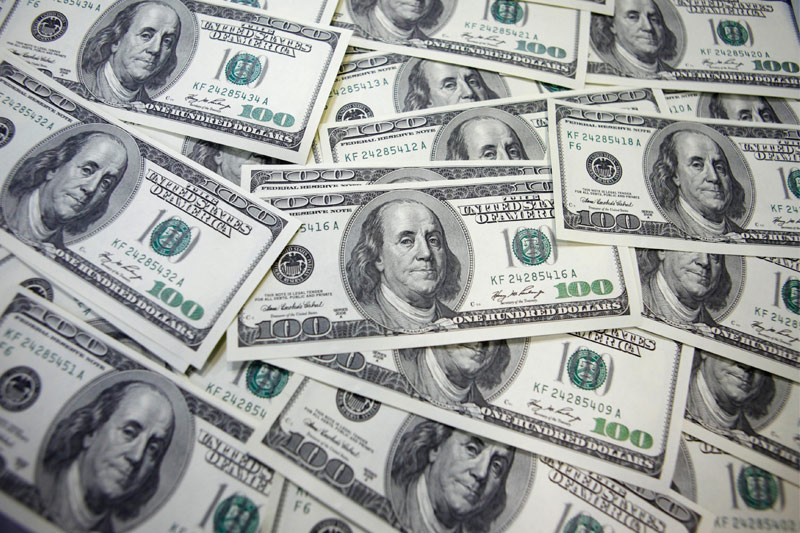Investing.com - The U.S. dollar was broadly higher against most of its major counterparts on Friday, concerns over the handling of Greece's financial woes continued to weigh, while worries over U.S. fiscal policy also persisted.
During European late morning trade, the dollar was higher against the euro, with EUR/USD falling 0.23% to 1.2718.
The euro came under pressure after German Finance Minister Wolfgang Schaeuble on Thursday said next week may still be too early to make a decision on granting further aid to Athens, despite a successful vote on new austerity measures.
Meanwhile, European Central Bank chief Mario Draghi praised Greece for going ahead with austerity reforms, but he said the ECB was "by and large done" with helping finance Greece.
Also Friday, official data showed that industrial production in France dropped 2.7% in September, more than the expected 1% decline, after a 1.9% rise the previous month.
In Italy, industrial production tumbled 1.5% in September, compared with expectations for a 1.4% drop, after a 1.7% increase the previous month.
The greenback was also higher against the pound, with GBP/USD shedding 0.23% to 1.5947.
Earlier in the day, official data showed that the U.K. trade deficit narrowed more-than-expected in September, hitting GBP8.4 billion from a deficit of GBP10 billion the previous month.
Analysts had expected the trade deficit to narrow to GBP8.9 billion in September.
Elsewhere, the greenback was lower against the yen, with USD/JPY dropping 0.35% to hit 79.20, but higher against the Swiss franc, with USD/CHF rising 0.28% to trade at 0.9484.
In addition, the greenback was steady to higher against its Canadian, Australian and New Zealand counterparts, with USD/CAD adding 0.04% to 1.0006, AUD/USD slipping 0.15% to 1.0389 and NZD/USD inching up 0.01% to hit 0.8149.
The Aussie came under pressure after the Reserve Bank of Australia reduced its 2013 growth outlook to 2.75%, earlier in the day.
But the export-linked currencies found some support after data showed that industrial production in China rose by 9.6% last month, more than the expected 9.4% increase and following a 9.2% rise in September.
The dollar index, which tracks the performance of the greenback versus a basket of six other major currencies, was up 0.15%, to trade at 81.02.
Overall market sentiment continued to be weighed by concerns over the U.S. fiscal cliff, automatic tax hikes and spending cuts due to come into effect on January 1 unless lawmakers can reach an agreement, which could threaten U.S. and global growth.
Later in the day, the U.S. was to produce preliminary data from the University of Michigan on consumer sentiment.
During European late morning trade, the dollar was higher against the euro, with EUR/USD falling 0.23% to 1.2718.
The euro came under pressure after German Finance Minister Wolfgang Schaeuble on Thursday said next week may still be too early to make a decision on granting further aid to Athens, despite a successful vote on new austerity measures.
Meanwhile, European Central Bank chief Mario Draghi praised Greece for going ahead with austerity reforms, but he said the ECB was "by and large done" with helping finance Greece.
Also Friday, official data showed that industrial production in France dropped 2.7% in September, more than the expected 1% decline, after a 1.9% rise the previous month.
In Italy, industrial production tumbled 1.5% in September, compared with expectations for a 1.4% drop, after a 1.7% increase the previous month.
The greenback was also higher against the pound, with GBP/USD shedding 0.23% to 1.5947.
Earlier in the day, official data showed that the U.K. trade deficit narrowed more-than-expected in September, hitting GBP8.4 billion from a deficit of GBP10 billion the previous month.
Analysts had expected the trade deficit to narrow to GBP8.9 billion in September.
Elsewhere, the greenback was lower against the yen, with USD/JPY dropping 0.35% to hit 79.20, but higher against the Swiss franc, with USD/CHF rising 0.28% to trade at 0.9484.
In addition, the greenback was steady to higher against its Canadian, Australian and New Zealand counterparts, with USD/CAD adding 0.04% to 1.0006, AUD/USD slipping 0.15% to 1.0389 and NZD/USD inching up 0.01% to hit 0.8149.
The Aussie came under pressure after the Reserve Bank of Australia reduced its 2013 growth outlook to 2.75%, earlier in the day.
But the export-linked currencies found some support after data showed that industrial production in China rose by 9.6% last month, more than the expected 9.4% increase and following a 9.2% rise in September.
The dollar index, which tracks the performance of the greenback versus a basket of six other major currencies, was up 0.15%, to trade at 81.02.
Overall market sentiment continued to be weighed by concerns over the U.S. fiscal cliff, automatic tax hikes and spending cuts due to come into effect on January 1 unless lawmakers can reach an agreement, which could threaten U.S. and global growth.
Later in the day, the U.S. was to produce preliminary data from the University of Michigan on consumer sentiment.
